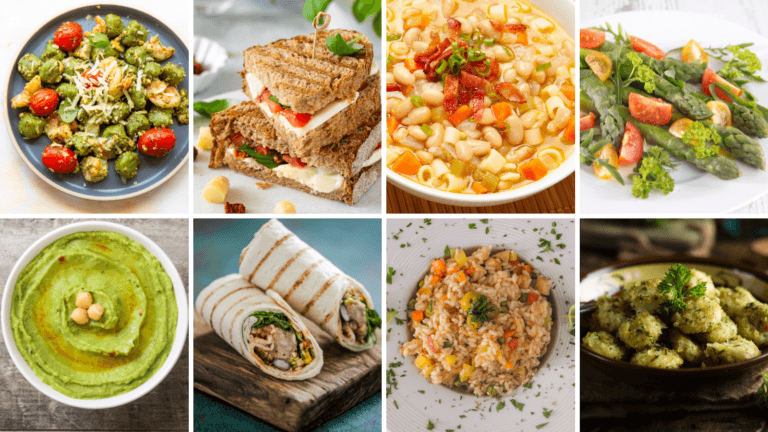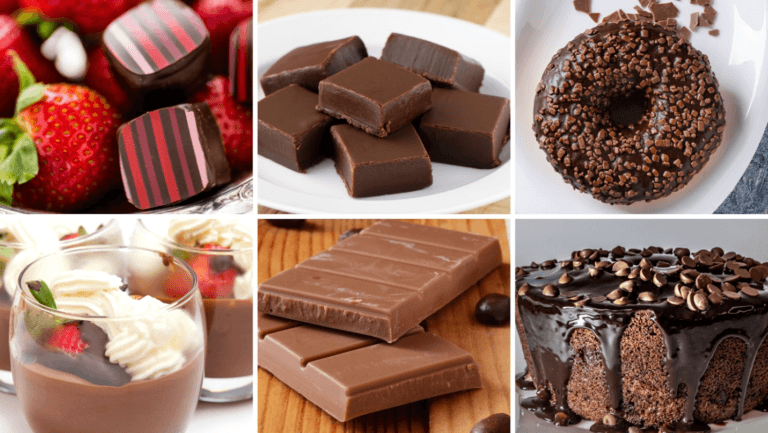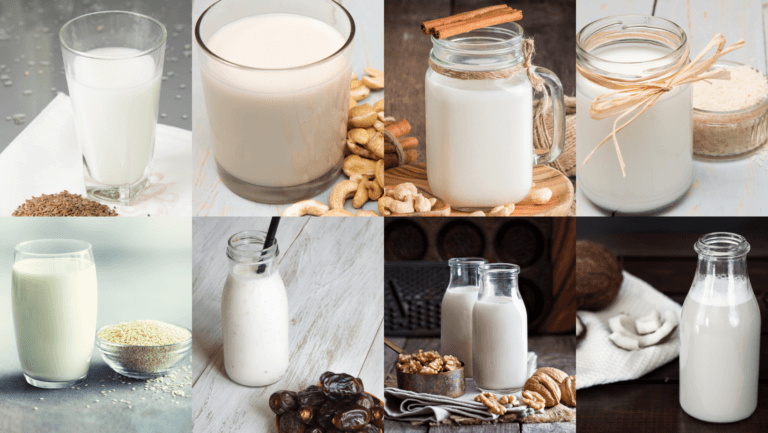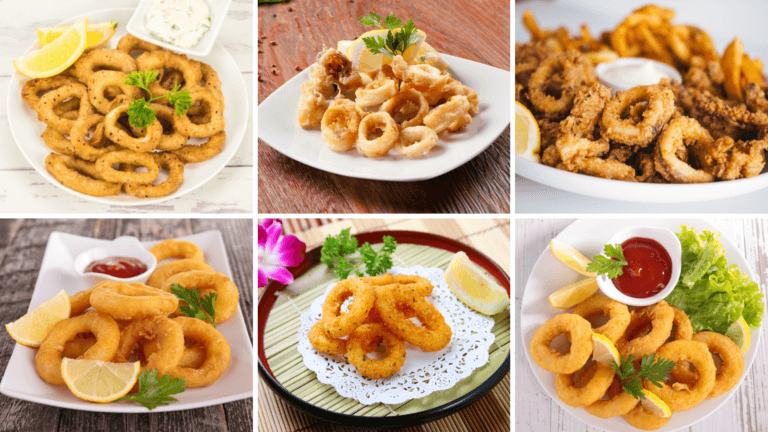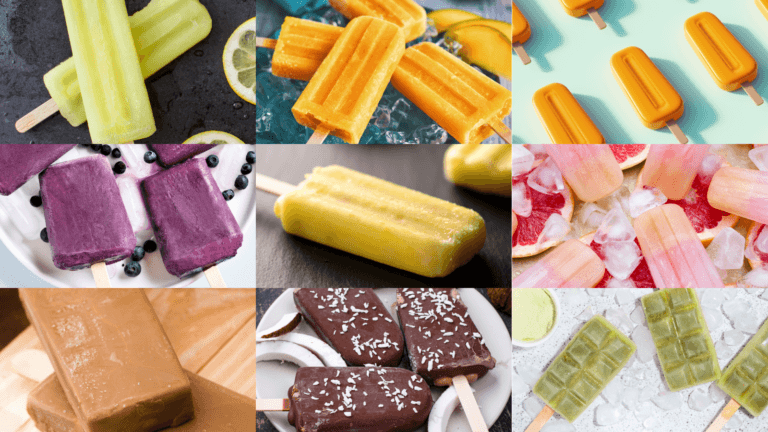Vegan Diet And Breastfeeding Secrets Every Mom Must Know
When carefully planned, a vegan diet and breastfeeding can provide essential nutrients to support both the mother’s health and the baby’s development.
Rich in plant-based proteins, healthy fats, and key vitamins, a well-balanced vegan diet supports milk production and infant development.
This guide explores the benefits, potential challenges, and best nutrient sources to ensure optimal health for nursing mothers and their babies on a vegan diet.
The Benefits Of A Vegan Diet During Breastfeeding
Here’s a list of 10 benefits of a vegan diet during breastfeeding, each with references:
Note: Reference data is sourced from various scientific journals and studies compiled from reliable nutrition and health websites.
1. Nutrient-Rich Breast Milk
A well-balanced vegan diet provides essential nutrients like folate, vitamin C, and antioxidants, which support a baby's brain development and immune function.
Fortified foods and supplements ensure adequate B12 and DHA. (Mangels, 2016, Journal of the Academy of Nutrition and Dietetics)
2. Lower Exposure To Toxins
Plant-based diets reduce exposure to environmental toxins like mercury and PCBs, commonly found in fish, leading to cleaner breast milk for the baby’s neurodevelopment. (Dórea, 2018, Environmental Research)
3. Improved Maternal Heart Health
A vegan diet is rich in fibre and plant sterols, lowering cholesterol and blood pressure and reducing postpartum cardiovascular risks. (Satija et al., 2017, Journal of the American College of Cardiology)
4. Enhanced Gut Health For The Baby
Breastfed infants of vegan mothers receive prebiotic-rich milk, supporting a healthy gut microbiome and lowering the risk of colic and digestive issues. (Milani et al., 2017, Frontiers in Microbiology)
5. Reduced Inflammation
A plant-based diet lowers inflammation through high polyphenol and omega-3 intake from flaxseeds, benefiting both mother and baby. (Calder, 2017, Proceedings of the Nutrition Society)
6. Better Postpartum Weight Management
Vegan mothers often experience healthier postpartum weight loss due to higher fibre intake and lower calorie density of plant-based foods. (Turner-McGrievy et al., 2016, Obesity)
7. Lower Risk Of Allergies In Infants
Studies suggest that breastfed babies of vegan mothers have a lower risk of eczema and dairy-related allergies due to the absence of cow’s milk proteins. (Kull et al., 2006, Journal of Allergy and Clinical Immunology)
8. Sustainable And Ethical Choice
A vegan diet supports sustainability by reducing carbon footprint and animal cruelty while promoting health, making it an ethical choice for new mothers. (Poore & Nemecek, 2018, Science).
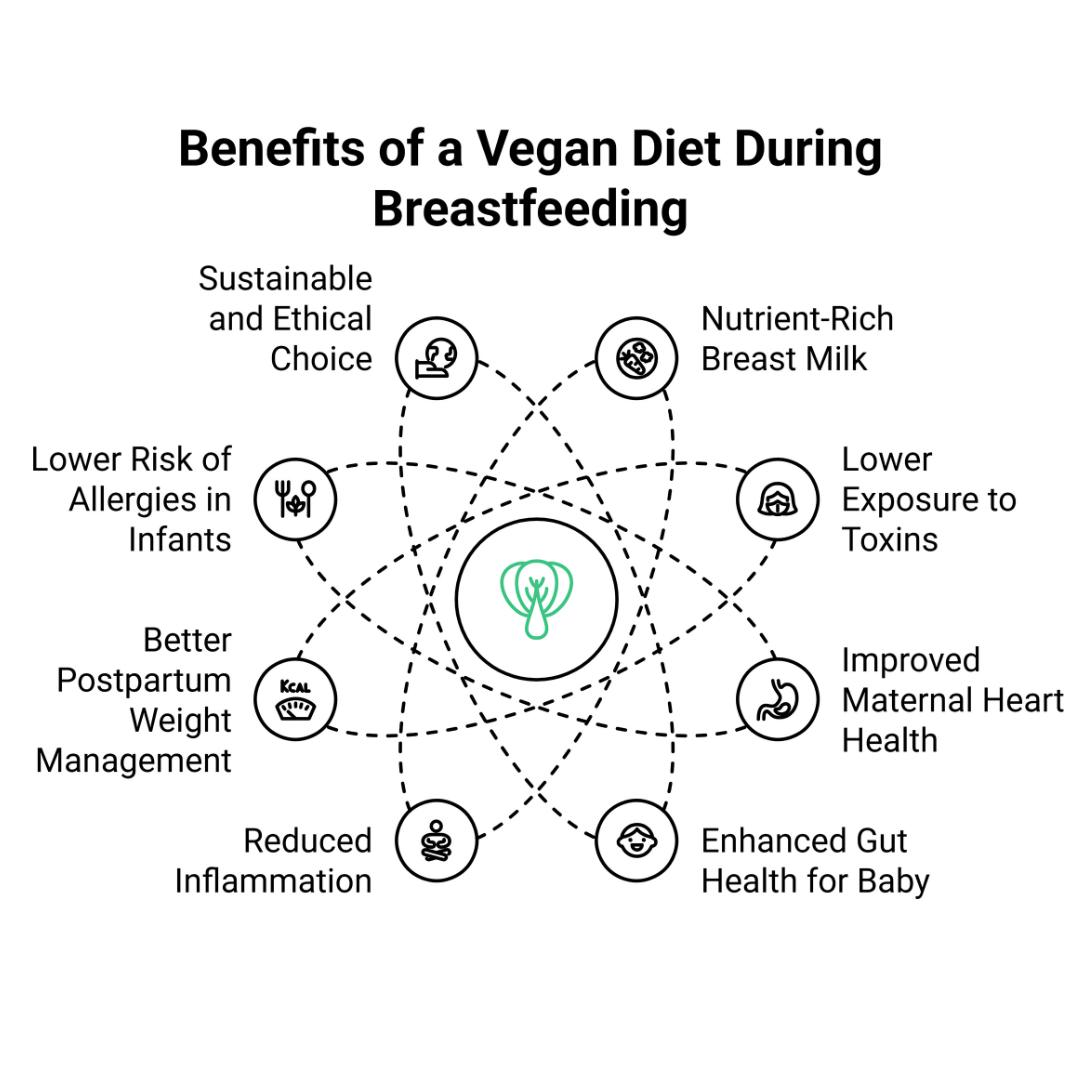
Key Nutrients For Vegan Breastfeeding Mothers
A well-planned vegan diet and breastfeeding require careful attention to key nutrients to ensure optimal growth and development for both mother and baby.
1. Protein
Protein supports tissue repair, immune function, and infant growth. Vegan sources include lentils, chickpeas, quinoa, tofu, tempeh, nuts, seeds, and whole grains.
These plant-based proteins provide essential amino acids, helping breastfeeding mothers meet their nutritional needs and promoting healthy development in their babies.
2. Vitamin B12
Vitamin B12 supports neurological development in infants but is mainly found in animal products. Vegan mothers can meet their needs through fortified plant-based milk, nutritional yeast, fortified cereals, or B12 supplements to ensure adequate levels for themselves and their breastfeeding baby.
3. Omega-3 Fatty Acids
Omega-3s, especially DHA, are vital for an infant’s brain and eye development. Vegan sources include chia seeds, flaxseeds, hemp seeds, walnuts, and algal oil supplements. These options help breastfeeding mothers ensure their babies receive essential fatty acids for healthy growth.
4. Iron
Iron supports oxygen transport and energy production. Since plant-based iron is less bioavailable, pairing it with vitamin C-rich foods boosts absorption.
Vegan sources include lentils, spinach, tofu, quinoa, and pumpkin seeds, ensuring adequate iron intake for breastfeeding mothers and their babies.
5. Calcium
Calcium is vital for bone health, and vegans can meet their needs with fortified plant-based milks, almonds, sesame seeds (tahini), and dark leafy greens like kale, bok choy, and collard greens. These sources help maintain strong bones for both mother and baby.
6. Vitamin D
Vitamin D promotes bone health and calcium absorption. Vegan mothers can obtain it through sun exposure, fortified plant-based milk, and supplements. Since natural food sources are limited, ensuring adequate intake is essential for maternal and infant bone strength.
7. Zinc
Zinc is necessary for both immune system function and wound healing. Vegan sources include legumes, nuts, seeds, and whole grains.
Since plant-based zinc is less bioavailable, regularly consuming a variety of foods helps maintain optimal maternal health and infant development.
8. Iodine
Iodine is essential for thyroid function and infant brain development. Vegan sources include seaweed (in moderation), iodized salt, and supplements.
Since iodine content in plant foods varies, ensuring adequate intake through fortified sources or supplements helps support maternal and infant health.
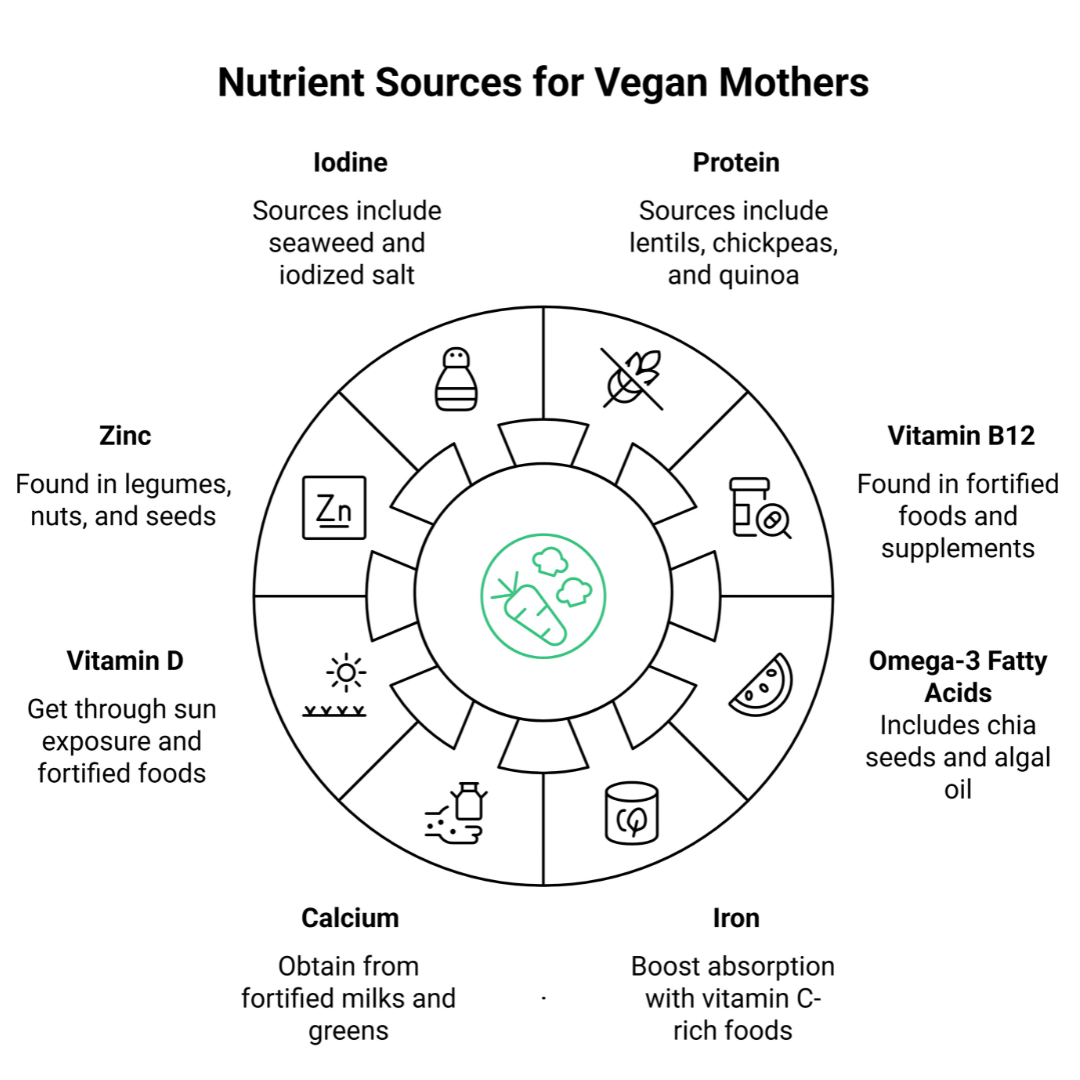
Tips For Maintaining A Healthy Vegan Diet While Breastfeeding
Maintaining a balanced vegan diet and breastfeeding is crucial for ensuring maternal health and the baby’s proper development. Here are some key tips to ensure you’re getting all the necessary nutrients:
1. Prioritize Protein Intake
Breastfeeding raises protein needs, making plant-based sources essential. For fiber and protein, include lentils, chickpeas, and beans.
Quinoa and whole grains provide complete proteins. Tofu, tempeh, and seitan offer high-quality protein, while nuts, seeds, and nut butter supply healthy fats and amino acids for optimal nourishment.
2. Get Enough Healthy Fats
Healthy fats support your baby's brain development. Include avocados for their healthy fats and fibre. Flaxseeds and chia seeds offer omega-3s, while walnuts provide brain-boosting nutrients. Coconut oil is a good source of monounsaturated and saturated fats that support brain function during lactation.
3. Ensure Adequate Calcium and Vitamin D
Get calcium from fortified plant milks like almond, soy, or oat milk. Dark greens, sesame seeds, tahini, and calcium-set tofu are great sources.
For Vitamin D, ensure daily sun exposure (15–30 minutes), consume fortified foods, and consider a vegan D3 supplement if needed for optimal breastfeeding nutrition.
4. Boost Your Iron Levels
Iron needs to increase during breastfeeding. Iron-rich foods, such as lentils, chickpeas, beans, pumpkin seeds, hemp seeds, and dark leafy greens, are also beneficial.
Fortified cereals are also helpful. Pairing and enhancing iron consumption while promoting overall health. to enhance absorption and to improve iron consumption while promoting overall health
5. Focus On Vitamin B12
Vitamin B12 is crucial for energy and your baby’s neurological development. Since it's primarily found in animal products, breastfeeding mothers should include fortified plant milk and cereals, nutritional yeast, and a reliable B12 supplement to meet their needs and ensure their and their baby’s health.
6. Omega-3 Fatty Acids for Brain Health
A vegan diet and breastfeeding can provide essential omega-3s, supporting the brain development of both mother and baby through plant-based sources like flaxseeds, chia seeds, and algal oil supplements. Algal oil supplements provide a reliable plant-based DHA source to support mom and baby’s health.
7. Stay Hydrated
Breastfeeding increases fluid needs, so it’s essential to stay hydrated. Drink plenty of water, herbal teas, and coconut water to maintain hydration.
Fresh smoothies can also be a great option, providing hydration and additional nutrients to support your health and breastfeeding needs.
8. Eat A Variety Of Whole Foods
For a balanced nutrient intake, include a variety of colourful fruits, vegetables, whole grains, and legumes in your daily meals.
This diverse selection helps provide essential vitamins, minerals, and fiber, supporting your health and the nutritional needs of breastfeeding.
9. Listen To Your Body
If you experience fatigue or a drop in milk supply, review your nutrient intake to ensure you're meeting your needs. If problems persist, seek specific guidance from a healthcare provider to help you stay healthy and support breastfeeding while ensuring your child receives the necessary nutrition.
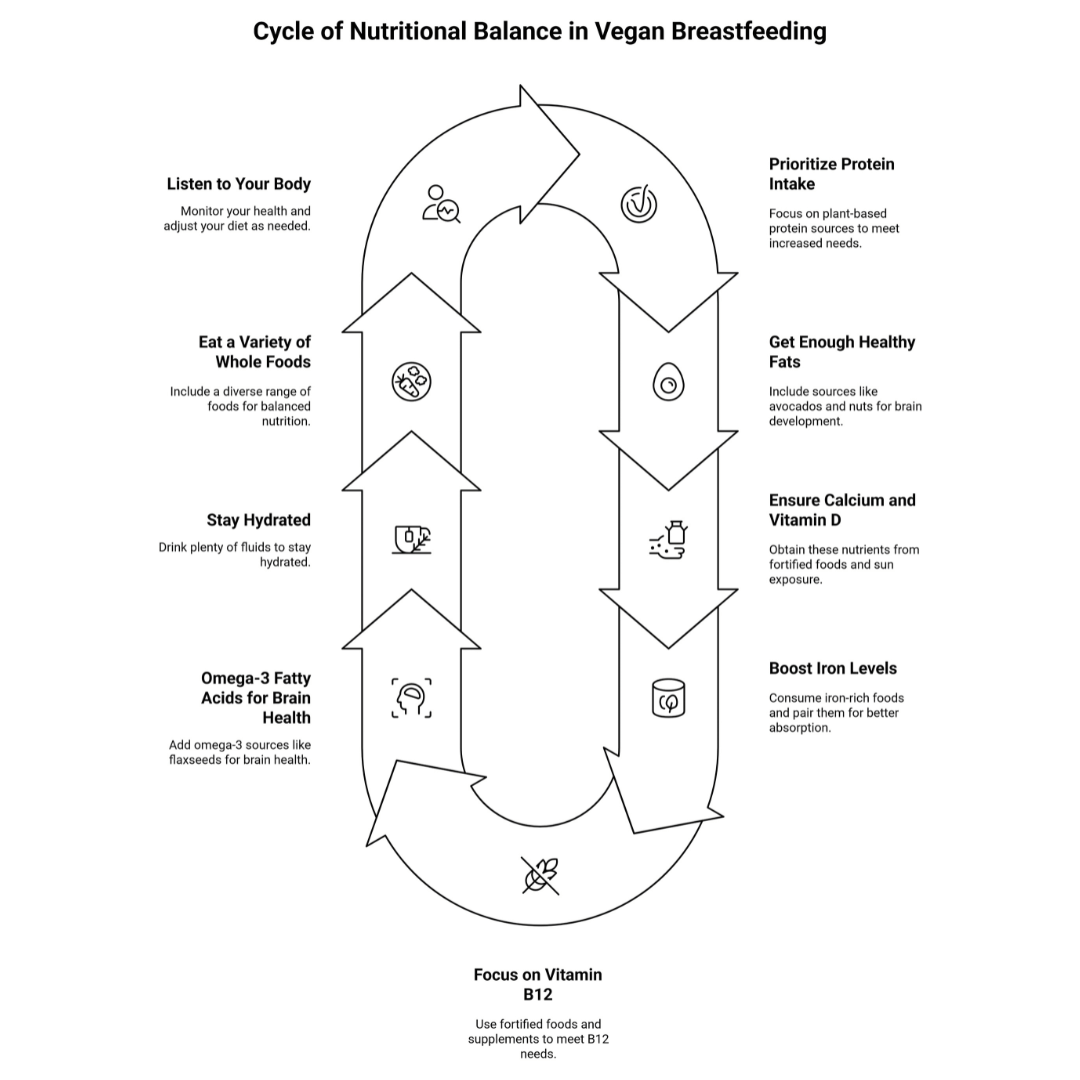
The Role Of Plant-Based Proteins In A Baby’s Growth And Development
Let’s explore how specific plant-based proteins contribute to building strong muscles, supporting organ growth, and promoting overall health for your baby.
1. Building Blocks For Baby’s Muscles
Proteins are made up of amino acids, which are essential for the growth and upkeep of tissues and muscles. Lentils, beans, quinoa, and other plant-based proteins provide a full spectrum of essential amino acids.
Although plant-based sources may lack some specific amino acids in their forms, combining different plant proteins throughout the day ensures your baby gets all the amino acids required for muscle growth.
Example
A meal combining quinoa (a complete protein) with lentils (rich in lysine) provides a complementary profile that covers all the amino acids needed for muscle growth and tissue repair.
2. Supporting Healthy Organ Development
A vegan diet and breastfeeding provide essential plant-based proteins, like quinoa. These proteins support the healthy development of the baby’s organs, including the brain, heart, and liver. Quinoa supplies all nine essential amino acids needed for overall growth during the early stages of life.
Example
The amino acid tyrosine found in beans helps produce dopamine, a neurotransmitter critical in developing the brain and nervous system.
3. Ensuring Immune Function
Proteins mainly build and maintain a robust immune system, which shields the infant from infections and illnesses. Lentils, beans, and quinoa provide the body with the necessary nutrients to produce antibodies and other immune system components.
Example
Legumes, like chickpeas, contain significant amounts of zinc and other minerals, which are key in building immunity and fighting infections.
4. Nutrient Density For Baby's Development
Plant-based proteins contain other essential nutrients like fiber, vitamins, and minerals. These nutrients promote not only muscle and organ growth but also cognitive function.
For instance, beans are rich in folate, a key nutrient for brain development, while quinoa contains magnesium and iron, essential for mental health and energy.
Example
Quinoa’s high levels of iron and magnesium are essential for your baby’s cognitive development and energy production.
5. Sustaining Energy And Growth
Consuming various plant-based proteins helps the baby’s growth and development. These proteins provide long-lasting energy and help form new tissues.
Protein is also critical for the baby’s growth during the prenatal and postnatal stages. Ensuring your diet is rich in plant-based protein supports your health and your baby's needs during breastfeeding.
Example
Both quinoa and lentils are abundant in protein and fiber, and when combined, they give the nursing mother steady energy and vital nutrients for the baby's development.
6. Promoting Healthy Weight Gain
Plant-based proteins like beans and quinoa help ensure that babies gain healthy weight. Unlike some animal-based proteins that can be harder for babies to digest, plant proteins are typically gentler on the digestive system, promoting healthy weight gain without stress on the infant’s system.
Example
A meal containing beans, quinoa, and avocado provides a balanced source of protein, fats, and carbohydrates, contributing to healthy weight gain and muscle development.
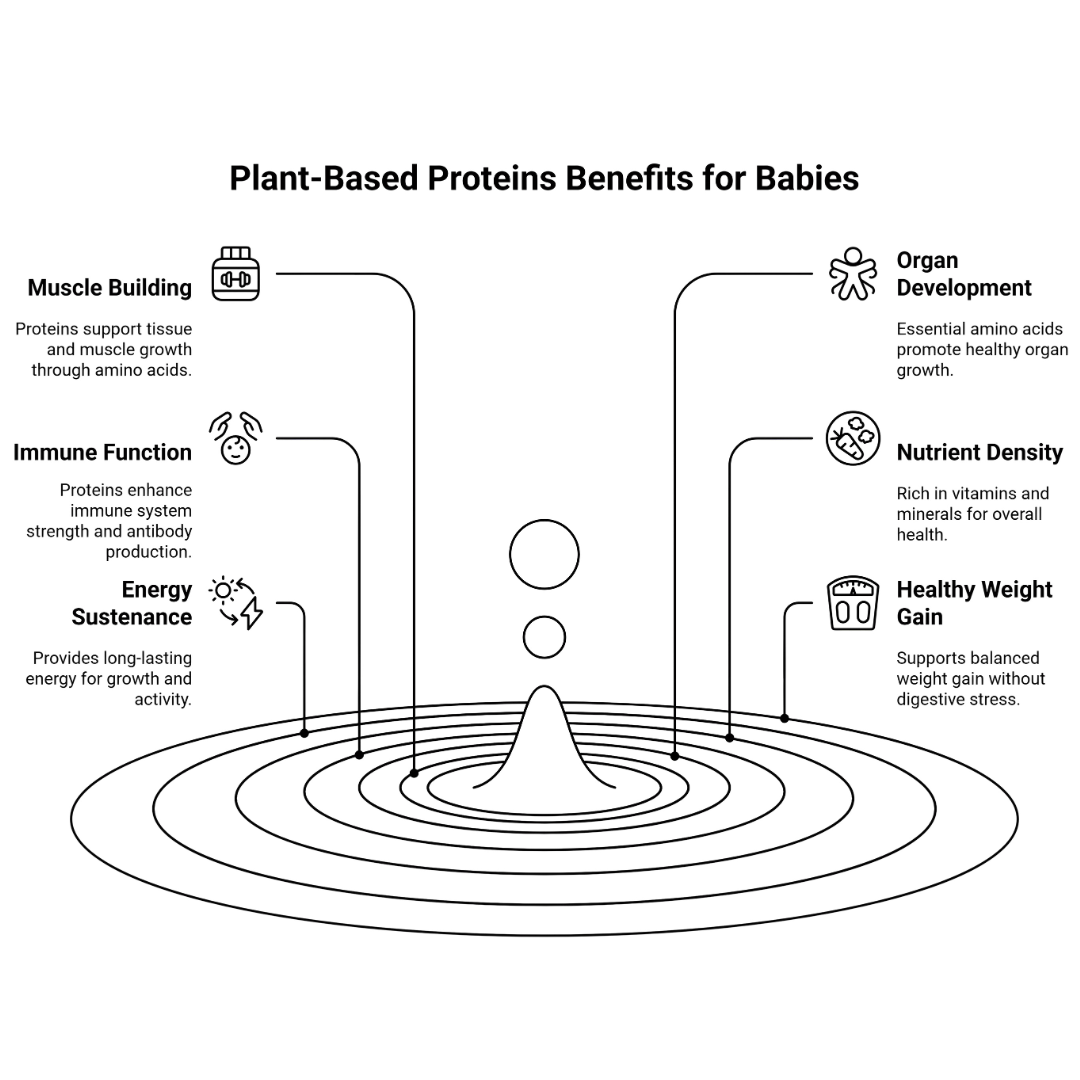
Sample Vegan Meal Plan For Breastfeeding Mothers
This vegan diet and breastfeeding meal plan ensures that mothers stay energized and nourished, providing essential nutrients for their health and their baby’s development. Rich in vital nutrients, healthy fats, and protein, these meals will help you and your child thrive!
Day 1
Breakfast: Creamy Oats With Almond Butter & Berries
- Cook ½ cup rolled oats with 1 cup almond milk until creamy.
- Stir in 1 tablespoon of almond butter for healthy fats and protein.
- For antioxidants and Omega-3s, top with 1 teaspoon of chia seeds, 1 teaspoon of flaxseeds, and a handful of fresh berries (blueberries, raspberries, or strawberries).
Lunch: Quinoa Salad With Chickpeas & Avocado
- Base: ½ cup cooked quinoa (rich in protein and fiber).
- Protein: ½ cup chickpeas (boosts iron and energy).
- Greens: 1 cup fresh spinach (high in folate and calcium).
- Healthy fats: ½ avocado (loaded with healthy fats).
- Dressing: Mix tahini (1 tablespoon), lemon juice (1 tablespoon), garlic, and water for a creamy, tangy dressing.
Snack
- A handful of crunchy almonds (great for protein and healthy fats).
- 1 crisp apple (good source of fiber and natural sugars for energy).
Dinner: Hearty Lentil Stew With Sweet Potatoes & Kale
- Sauté onions, garlic, and diced sweet potatoes in olive oil.
- Add ½ cup lentils, 2 cups vegetable broth, diced tomatoes, and kale.
- Simmer for about 25 minutes or until the sweet potatoes and lentils are tender.
- Serve with ½ cup cooked brown rice for extra fibre.
Drink
- Herbal tea (like chamomile or peppermint for relaxation.
- Plenty of water to stay hydrated.
Day 2
Breakfast: Savoury Tofu Scramble On Whole-Grain Toast
- Crumble ½ block firm tofu and sauté with bell peppers, spinach, turmeric, and black salt (for an “eggy” flavour).
- Serve on 2 slices of whole-grain toast for a fiber boost.
Lunch: Hummus & Avocado Wrap
- Spread 2 tablespoons of hummus on a whole-grain wrap.
- Add sliced cucumbers, bell peppers, shredded carrots, and avocado.
- Before rolling it up, toss in a handful of mixed greens.
Snack
- Crunchy carrot sticks (great source of beta-carotene).
- Pumpkin seeds (high in iron, zinc, and magnesium).
Dinner: Chickpea & Vegetable Curry With Quinoa
- Sauté onions, garlic, ginger, and spices (turmeric, cumin, coriander, garam masala).
- Add 1 cup of chickpeas, diced tomatoes, and mixed vegetables (like zucchini and bell peppers).
- Simmer for 20 minutes and serve over ½ cup fluffy quinoa.
Drink
- Coconut water (rich in electrolytes for hydration).
- Plenty of water throughout the day.
Day 3
Breakfast: Nutrient-Packed Green Smoothie
- Blend 1 banana, 1 cup of fresh spinach, 1 tablespoon of flaxseeds, 1 scoop of vegan protein powder, and 1 cup of almond milk.
- Optional: Add 1 teaspoon of peanut butter for extra creaminess.
Lunch: Lentil & Avocado Salad With Lemon-Tahini Dressing
- Base: ½ cup cooked lentils (packed with protein and fiber).
- Veggies: Sliced cherry tomatoes, cucumbers, red onions.
- Healthy fats: ½ avocado (adds creaminess and essential fats).
- Dressing: Mix tahini, lemon juice, olive oil, and garlic for a rich, tangy dressing.
Snack
- Cucumber slices with creamy hummus (great for hydration and protein).
Dinner: Vegan Chilli With Cornbread
- In a pot, sauté onions, garlic, and bell peppers.
- Add 1 can of black beans, 1 can of kidney beans, 1 can of diced tomatoes and chilli seasoning.
- Simmer for 30 minutes.
- Serve with a slice of homemade cornbread (made with cornmeal, almond milk, and flax eggs).
Drink
- Fresh fruit smoothie (banana, strawberries, and almond milk).
- Plenty of water throughout the day.
Want to Share Your Passion for Vegan Living?
Discover how easy and fulfilling vegan living can be —
from recipes and travel to lifestyle and sustainability tips.
Read this blog post next:
How to Start a Vegan Blog (and Turn Your Passion into Purpose).
Day 4
Breakfast: Chia Seed Pudding
- Combine 1 cup coconut milk, 1 teaspoon vanilla essence, 1 tablespoon maple syrup, and 2 tablespoons chia seeds.
- To make it thicker, refrigerate it overnight.
- Top with a handful of fresh berries (strawberries, blueberries, or raspberries).
Lunch: Buddha Bowl
- Base: ½ cup cooked quinoa.
- Protein: ½ cup roasted chickpeas (seasoned with cumin and paprika).
- Veggies: ½ cup roasted sweet potatoes and ½ cup steamed kale.
- Dressing: Drizzle with tahini dressing (1 tablespoon tahini, lemon juice, garlic, and water).
Snack
- Handful of walnuts (great for Omega-3s).
- A few dried apricots (rich in iron).
Dinner: Stuffed Bell Peppers
- Cook ½ cup of lentils and ½ cup of brown rice with diced tomatoes, onion, and spices.
- After removing the seeds, cut the bell peppers in half and fill them with the lentil mixture.
- Bake at 375°F (190°C) for 25 minutes.
Drink
- Warm almond milk with a dash of cinnamon for a soothing, calcium-rich beverage.
Day 5
Breakfast: Whole-Grain Toast with Peanut Butter & Banana
- Toast 2 slices of whole-grain bread.
- Spread with 2 tablespoons of peanut butter.
- Top with sliced banana and a sprinkle of hemp seeds for added protein and Omega-3s.
Lunch: Chickpea & Avocado Toast
- Mash ½ cup chickpeas with ½ avocado, lemon juice, and a pinch of salt.
- Spread on whole-grain toast and top with fresh mixed greens.
Snack: Trail Mix
- A mix of almonds, walnuts, pumpkin seeds, sunflower seeds, and dark chocolate chips.
Dinner: Miso Soup With Tofu & Soba Noodles
- In 4 cups of vegetable broth, add 1 tablespoon of miso paste, diced tofu, seaweed, and mushrooms.
- Cook ½ cup soba noodles separately and add to the soup.
Drink
- Green tea is good for antioxidants, and plenty of water is good for hydration.
Day 6
Breakfast: Smoothie Bowl
- Blend 1 banana, ½ cup of mango, 1 tablespoon of chia seeds, and 1 cup of almond milk.
- Pour into a bowl and top with granola, shredded coconut, and sliced almonds.
Lunch: Lentil & Quinoa Veggie Burger
- Mix ½ cup cooked lentils, ½ cup cooked quinoa, grated carrots, breadcrumbs, garlic, and flax egg.
- Shape into patties and pan-fry in olive oil.
- Serve with lettuce and avocado on whole-grain bread.
Snack
- Handful of cashews for healthy fats.
- Dates for natural energy and iron.
Dinner: Roasted Vegetable Stir-Fry With Tofu
- Sauté cubed tofu, broccoli, bell peppers, and carrots in sesame oil.
- Add ginger, soy sauce and garlic for flavour.
- Serve over ½ cup of brown rice.
Drink
- Fresh lemon-infused water to stay hydrated.
Day 7
Breakfast: Vegan Pancakes
- Mix 1 cup oat flour, 1 tablespoon flaxseed meal, 1 teaspoon baking powder, 1 mashed banana, and almond milk to make a pancake batter.
- Cook in a pan and top with almond butter and fresh fruit.
Lunch: Mediterranean Falafel Bowl
- 3-4 falafels served with hummus, tabbouleh (parsley, tomato, quinoa, lemon), and whole-grain pita bread.
Snack
- Apple slices with almond butter for protein and fiber.
Dinner: Spaghetti With Lentil Marinara Sauce
- Cook whole-grain spaghetti and top with a sauce made from sautéed onions, garlic, diced tomatoes, and lentils.
- Serve with a side of steamed greens.
Drink
- Chamomile tea to relax before bed.
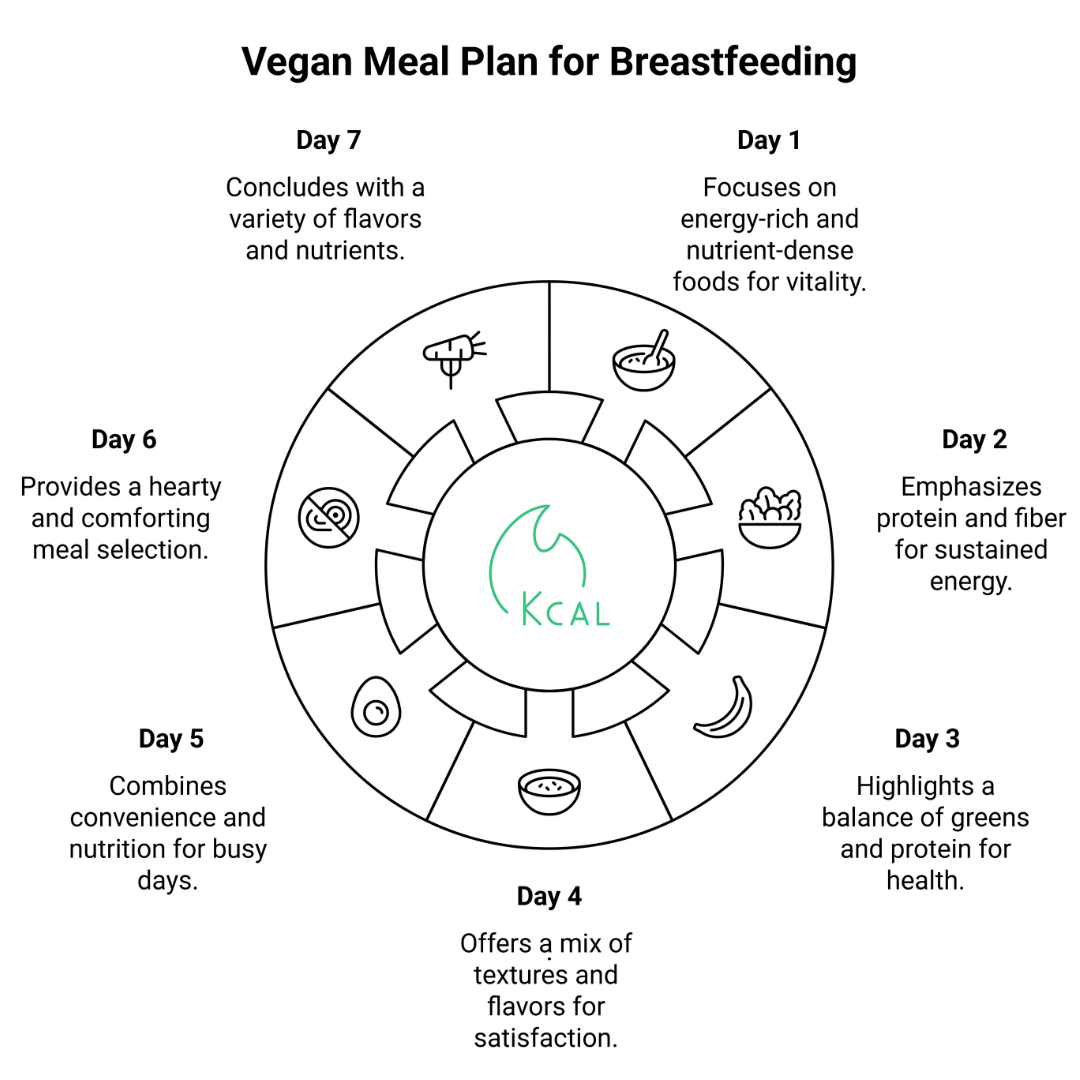
Conclusion
In conclusion, a well-planned vegan diet and breastfeeding can provide all essential nutrients, supporting both the mother's and the baby's health, milk production, and development.
Mothers can support milk production, infant development, and overall health by prioritizing plant-based proteins, healthy fats, and key vitamins.
With mindful food choices and proper supplementation, breastfeeding on a vegan diet can be nourishing and sustainable for both mom and baby.
I trust you enjoyed this article on the Vegan Diet and Breastfeeding Secrets Every Mom Must Know. Please stay tuned for more plant-based recipes, vegan travel tips, and lifestyle inspiration.
Take care!
— JeannetteZ 🌿
💬 Your Opinion Is Important To Me
Do you have thoughts, ideas, or questions? I’d love to hear from you. Please leave your comments below, or email me directly at Jeannette@LivingTheVeganLifestyle.org.
📚 More Vegan Lifestyle Reads
🌱 My #1 Recommendation for Online Success
Sharing my passion for vegan living — from food to fashion — has been such a rewarding journey.
If you’ve ever dreamed of building your own ethical lifestyle brand or blog, this is the best place to start.
🌟 See How Vegan Bloggers Build Online Income — Try WA Free (No Credit Card Needed)
Disclosure
This post may contain affiliate links. As an Amazon Associate and participant in other affiliate programs, I earn from qualifying purchases at no extra cost to you. Please read my full affiliate disclosure.


